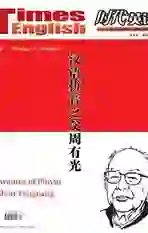汉语拼音之父:周有光
2014-02-28
周有光,如果不是研究汉语或是对汉语感兴趣的人,或许对这个名字很陌生。殊不知,这位今年108岁高寿的学者就是我们每天工作学习都离不开的汉语拼音的创始人之一。现在,就让我们一起走进周老先生的世界吧。
Even at 108 years old, Zhou Youguang is the kind of creative thinker that Chinese leaders regularly command the government to cultivate in their bid to raise their nation from the worlds factory floor.
Mr Zhou is the inventor of Pinyin, the Romanized spelling system that linked Chinas ancient written language to the modern age and helped China all but stamp out illiteracy. He was one of the leaders of the Chinese translation of the Encyclopedia Britannica in the 1980s. He has written about 40 books, the most recent published in 2011.
Chinese characters do not directly correspond to sounds. Pinyins phonetic alphabet enabled learners to match words easily to actual speech.
“It had an enormous impact on literacy,” said Victor H. Mair, a professor of Chinese language and literature at the University of Pennsylvania. All Chinese students now begin to read and write using Pinyin before moving on to characters.
Sweet-natured but wry and rigidly dispassionate, Mr Zhou works at a tiny wooden desk in a government-provided, third-floor walk-up apartment with unpainted concrete walls. His longtime colleague Chen Zhangtai, 82, said Mr Zhou thought renovations would be too distracting.
He described Mr Zhou as the embodiment of a “true scholar.” He added, “His blog entries range from the modernization of Confucianism to Silk Road history and Chinas new middle class. Computer screens hurt his eyes, but he devours foreign newspapers and magazines. A well-known Chinese artist nicknamed him ‘Trendy Old Guy ”.
Mr Zhou was born on Jan. 13, 1906, when the Qing Dynasty ruled and women bound their feet. The son of a Qing Dynasty official, he married the daughter of a wealthy family and went into banking.
After the Japanese invaded in 1937, his family was forced into the countryside to escape Japanese bombs in Chongqing, Chinas wartime capital. His 5-year-old daughter died from appendicitis.
In 1946, Mr Zhou and his family moved to New York, where he represented the Xinhua Trust and Savings Bank. He toured the United States in luxury Pullman cars, rode the Queen Elizabeth ocean liner to Europe and fended off offers from Western banks. His intellectual life was equally rich: he had several lengthy chats with Albert Einstein.
In 1949, Mr Zhou brought his family home. He taught economics at a university in Shanghai and studied linguistics as a hobby.
In 1955, Zhou Enlai, prime minister, called him to Beijing. The party wanted to make Mandarin Chinas national language, simplify Chinese characters and devise a new phonetic alphabet.
Mr Zhous son, Zhou Xiaoping, an astrophysicist, said his father protested that he was a mere amateur. He was told: “Everyone is an amateur.”
In his new job, Mr Zhou found tremendous confusion, but also a foundation for his work. In the late 1500s, the Italian Jesuit Matteo Ricci had formulated a system to Romanize Chinese characters. Many English speakers were already using the British Wade-Giles system developed in the 19th century. Chinese linguists had devised other alternatives.
Mr Zhou argued for the Roman alphabet, to better connect China with the outside world. In 1958, after three years of work, Pinyin—literally “to piece together sounds”—was finished and quickly adopted.
Mr Zhou says Chinese characters will exist for centuries to come. But to his delight, Pinyin has proven ever more useful. Chinese now rely on Pinyin-to-character programs to input chinese characters, text messages, post on Internet microblogs and write e-mails.
尽管已经108岁高龄,周有光老先生仍然是一位极富创见的思想家。我国领导人时不时地都会要求政府工作人员去聆听他的意见,以提高中国在世界工厂中的地位。
周老先生发明了拼音,用拉丁字母来拼写古老的中国汉字,让我国文字现代化,这几乎帮助我国消灭了文盲。20世纪80年代,他曾主持翻译中文版的《不列颠百科全书》。他有40余本著作,最近一本是2011年出版的。
汉字本身并不直接表示发音。拼音的音标字母使学习者能够轻而易举地将文字与发音匹配在一起。
“它对读写识字产生了重要的影响。”宾夕法尼亚大学中国语言与文学教授Victor H. Mair这样说,“现在所有的中国学生在学习汉字以前都先学习使用拼音读写。”
周老天性温和,严厉公正又不失诙谐。他住在一处政府提供的三层楼高的公寓里,他有一个木制办公桌,水泥墙面并没有粉刷。他的老同事,82岁的陈章太说:“周老觉得装修实在是太麻烦了。”
陈章太认为周老是真正的学者。他说:“他只不过看上去似乎与这个世界和平相处。”他还是为这个世界着迷。他的博客谈古论今,从儒学现代化到丝绸之路的历史,再到中国新中产阶级。电脑屏幕对他的眼睛不好,他就花时间去看外国的报纸杂志。一位家喻户晓的中国艺术家给他取了个绰号叫‘新潮老头。”
周老生于1906年1月13日,那是清朝末年妇女还裹小脚的时代。他的父亲是一位清朝官员。后来周老娶了一位有钱人家的小姐,进了银行业。
1937年,日本入侵以后,他全家被迫逃亡乡下,躲避日军在战时首都重庆的炮火。他5岁的女儿死于阑尾炎。
1946年,周老一家迁居纽约,当时他是新华信托储蓄银行的代表。他搭乘奢华的普尔曼卧铺车环游美利坚,乘坐伊丽莎白女王号远洋邮轮奔赴欧洲,还拒绝了西方一些银行的工作机会。他的学术生活也同样丰富,他曾多次与爱因斯坦长谈。
1949年,周老带着家人返回中国。他在上海的一所大学教经济学,并出于爱好而研究语言学。
1955年,时任国家总理周恩来邀请他去北京。国家希望将普通话设立为中国的官方语言,简化汉字,并且要设计一套音标字母。
周老的儿子、天体物理学家周晓平说:“当时我父亲反对说他只是个业余语言学家,但得到的反馈是‘大家都很业余。”
面对新工作,周老也很彷徨,不过也找到了一些工作的基本原则。16世纪晚期,来自意大利的耶稣会士利玛窦发明了一套中国汉字的拉丁化系统。许多说英语的人也早已开始使用在19世纪发展的英国韦氏音标。中国的语言学家们也已经设计了一些其他的注音方法。
周老赞同使用罗马字母,这样会更好地让中国同世界连在一起。1958年,经过三年的工作,拼音系统(字面意义就是“把声音拼凑起来)完成,并且很快地得到采纳。
周老表示,中国汉字还会在未来几个世纪里继续存在。不过他很高兴见到拼音是那么有用。现在中国人都依赖拼音进行汉字输入、发短信、写电子邮件,还有写微博。
